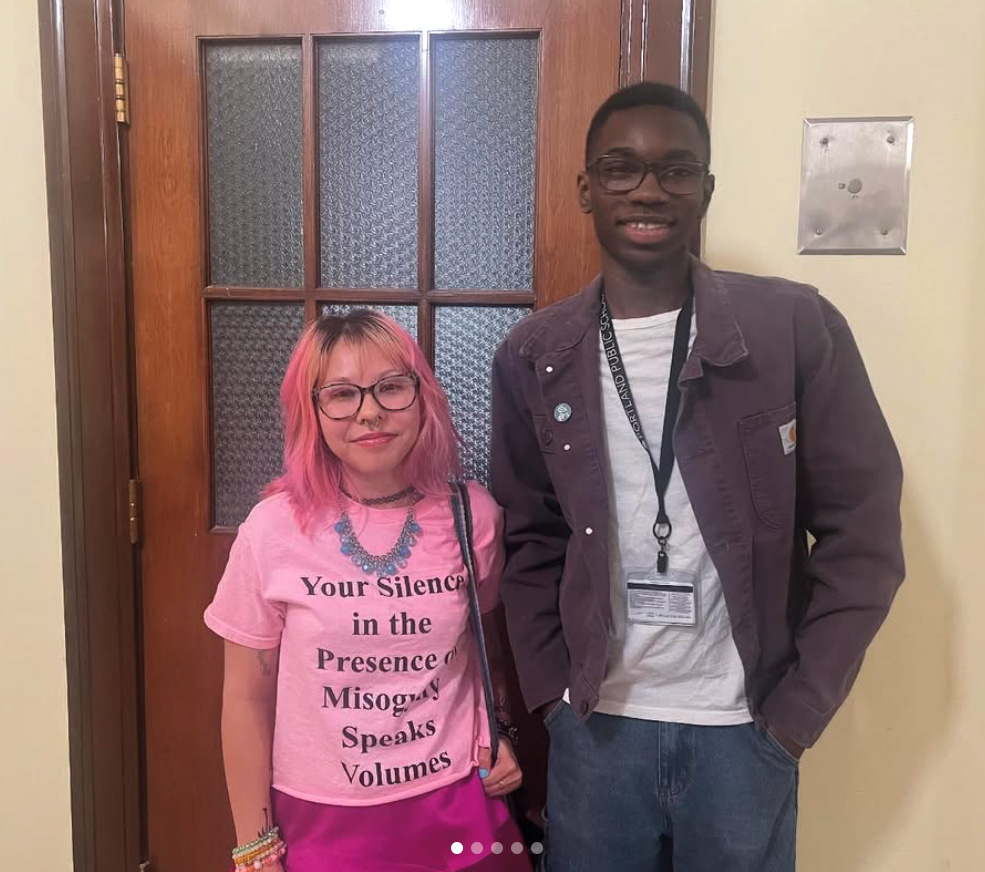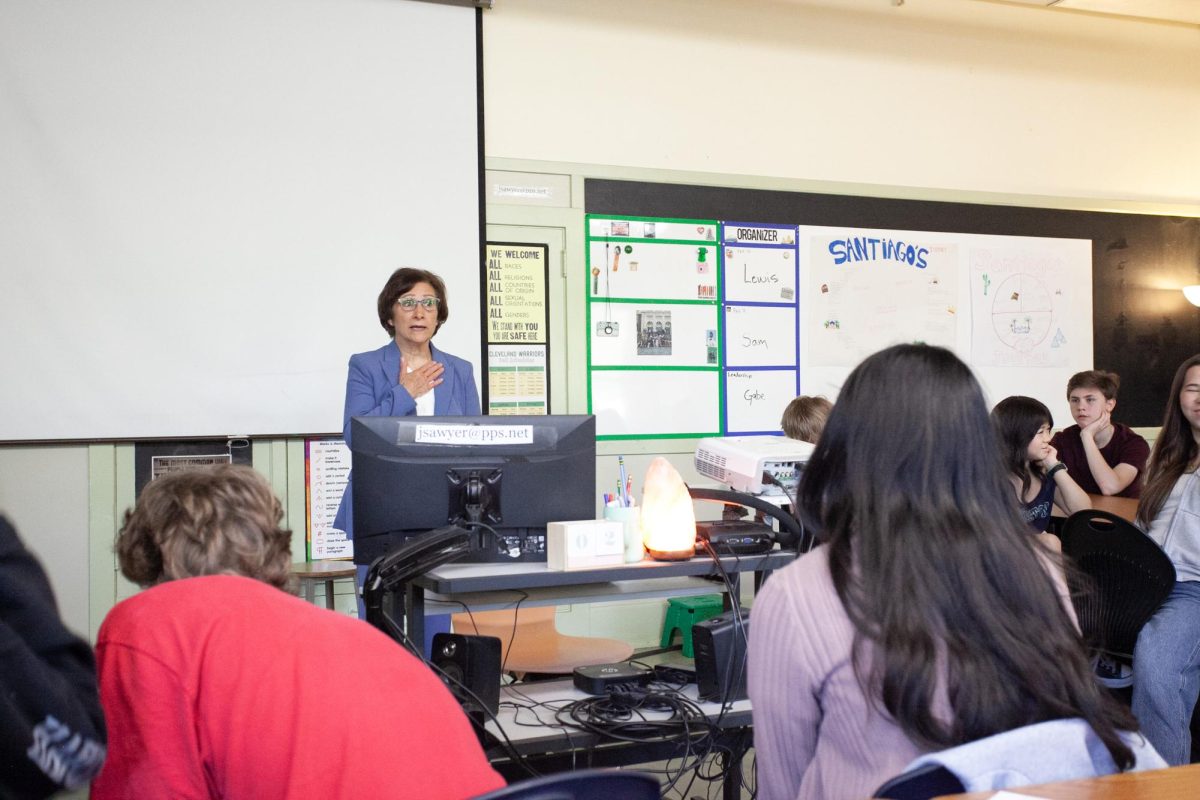Living in the Era of “Screenagers”
Teen Distraction through the Ages
March 19, 2018
It’s a daily occurrence for a teacher to tell their class the common phrase, “Get off your phones!” ( Or “Put your fancy phones away,” “Adios teléfonos,” “I don’t want to see any phones,” etc…) But the distraction remains, tucked under desks and in laps, or burning a hole in the back pocket of your jeans. It might only take one notification, that screen lighting up with a message, for you abandon this article altogether.
Ding!
No, stay with me here. Since the debut of the iPhone in 2007, smartphones have become a constant presence for teens both in and out of the classroom, much to the concern of parents and teachers.
“I find that the presence of phones means people don’t hear stuff and I’ll have to repeat myself several times,” said English teacher Eric Levine. “There’s a loss of ability to stay focused for longer periods of time.”
And parents have noticed this as well. For the first time, teenagers are growing up with screens, earning them the title of “screenagers.”
On Wednesday Feb. 28 the Cleveland High School PTA, with collaboration from Winterhaven School and Portland Waldorf School, hosted a free screening of the documentary “Screenagers” for members of the Cleveland community. The film follows filmmaker and physician Delaney Ruston as she debates giving her daughter a phone while exploring the effects screens have on children and their health, academics, and interpersonal relationships.
“It was the best attended PTA event I have ever organized. We had over 300 people pre-register,” said Susan Duck, who is responsible for organizing PTA programs that support parents, students, and staff. “There was not one parent that I spoke with that was not interested in the topic of teens and screen time especially since this was a documentary made by a physician with a teen facing the same challenges that we, as parents, currently face.”
She continued, “I think parents were pretty alarmed by the scientific data that showed the negative impacts of screen time.” Studies cited in the movie showed that mice who are overstimulated— an effect than can be caused by too much time around screens— took longer to go through a maze and still found the maze more challenging after being overstimulated than mice who had no prior overstimulation.
The film also covered addiction to screens and shared the story of a young man who became so addicted to gaming that he dropped out of school before eventually going into a “detox” program.
One parent who attended the event said, “The statistics about how long-lasting the negative effects of screen time are were certainly frightening, as was the story of the addicted young man who ended up in rehab, saying it was a constant struggle to keep his focus. However, I remember thinking during the screening that a teen would brush off those kinds of stories as overbearingly alarmist.” They continued, “Given the importance of addressing this topic ASAP with young minds at stake, I think this film would be helpful for parents of younger children more than parents of sassy teens.”
Indeed, for many students their phones have become ingrained in their way of life and how they pass the time. Junior Kira Chan said, “I think for a lot of students it’s an instinct to go to their phones. For example, after a test or finishing an assignment early, it’s something that’s right in your pocket or bag, and teenagers have become so accustomed to using technology that it’s one of the first things they turn to.”
But before there were phones, students still found ways to distract themselves from their lessons. “Passing notes was great,” said Levine of his time in school. “If you wanted to send a note to someone on the other side of the room you’d write the note on a little strip of paper and fold it up, write for So-and-So. DO NOT LOOK! and then tell the person next to you, ‘Hey pass this to So-and-So! And it would get passed along. If the teacher asked we’d all act clueless. It’s always been about socializing.”
Other kids would read books under their desk, though as it is with phones, the success of this is dependant on where one sits in the class. Many students don’t realize that teachers can see under the desks or that spending an entire period with your head bent at a 90 degree angle is suspicious. “Some kids don’t try to hide that they’re reading a book. I have a freshman in one of my classes who’s always reading and you can’t sneak it because it’s Harry Potter,” said Levine.
“In my case [as a teacher] it was never phones. It was the class clown looking for attention. That’s so much different than a class of students all on their phones,” said Special Projects Coordinator Jan Watt. Indeed the phones, these palm sized supercomputers have caused a remarkable shift in the landscape of human interaction.
Take for example the 1984 John Hughes movie “Sixteen Candles.” The main character Samantha reveals her crush in a note meant for her friend. As they sit in study hall together she uses a sly yawn and stretch maneuver to drops the note by her friend’s on the floor by her friend’s desk. But she’s asleep and the note gets intercepted by none other than the dream boy himself. If this story were to appear on screen today (though it most likely would not for a host of other problematic reasons) how could a text or Snapchat get serendipitously passed on?
On the other hand, more serious messages can spread rapidly like on Monday March 5 when a school shooting threat distributed on social media caused widespread fear and concern, disrupting classes. It proved to be a false alarm but tensions were still high when PPS experienced district-wide internet outage that also affected non-landline phones. It also set teachers back as many classrooms operate using computer presentations rather than the classic whiteboard, or even chalkboard.“I’ve watched it evolve and the day that the [internet] went out was awful because it was such a departure from the way we run things now,” said Watt.
As Bob Dylan said, “The times they are a-changin’,” and as a society we’re all learning how to live with both the devices in our pockets and the people around us. “[Screens] are not going away. We’re not going to go back to before unless some electromagnetic catastrophe befalls us,” said Levine.











